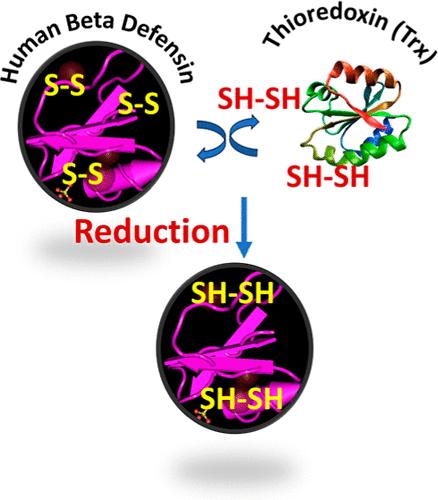当前位置:
X-MOL 学术
›
J. Med. Chem.
›
论文详情
Our official English website, www.x-mol.net, welcomes your
feedback! (Note: you will need to create a separate account there.)
Restoration of the Lost Human Beta Defensin-1 Protein in Cancer as a Strategy to Improve the Efficacy of Chemotherapy
Journal of Medicinal Chemistry ( IF 6.8 ) Pub Date : 2024-08-13 , DOI: 10.1021/acs.jmedchem.4c01040 Raghu Pandurangi 1 , Thillai Sekar 2 , Ramasamy Paulmurugan 2
Journal of Medicinal Chemistry ( IF 6.8 ) Pub Date : 2024-08-13 , DOI: 10.1021/acs.jmedchem.4c01040 Raghu Pandurangi 1 , Thillai Sekar 2 , Ramasamy Paulmurugan 2
Affiliation

|
Both innate and adaptive immunity are important components of the human defense system against various diseases including cancer. Human beta defensin-1 (hBD-1) is one such immunomodulatory peptide which is lost in malignant cancers, while high levels of expression are maintained in benign cells, making it a potential biomarker for the onset and metastasis of the disease. Triple-negative breast cancer (TNBC) is an aggressive form of breast cancer for which no targeted therapy has been approved so far. That makes chemotherapy a first line of treatment despite high side effects. A priori Activation of Apoptosis Pathways of Tumor often referred to as AAAPT technology is a novel targeted tumor sensitizing technology that sensitizes low responsive and resistant tumor cells to evoke a better response from the current treatments for TNBC. Here, we show that hBD-1 is a targeted tumor sensitizer.
中文翻译:

恢复癌症中丢失的人类 Beta Defensin-1 蛋白作为提高化疗疗效的策略
先天性免疫和适应性免疫都是人类防御系统抵御包括癌症在内的各种疾病的重要组成部分。人β防御素-1 (hBD-1) 就是一种这样的免疫调节肽,它在恶性肿瘤中丢失,而在良性细胞中保持高水平表达,使其成为疾病发生和转移的潜在生物标志物。三阴性乳腺癌(TNBC)是一种侵袭性乳腺癌,迄今为止尚未批准靶向治疗。尽管副作用很大,但这使得化疗成为一线治疗方法。先验激活肿瘤细胞凋亡途径通常称为 AAAPT 技术,是一种新型靶向肿瘤敏化技术,可敏化低反应性和耐药性肿瘤细胞,以激发当前 TNBC 治疗的更好反应。在这里,我们证明 hBD-1 是一种靶向肿瘤敏化剂。
更新日期:2024-08-13
中文翻译:

恢复癌症中丢失的人类 Beta Defensin-1 蛋白作为提高化疗疗效的策略
先天性免疫和适应性免疫都是人类防御系统抵御包括癌症在内的各种疾病的重要组成部分。人β防御素-1 (hBD-1) 就是一种这样的免疫调节肽,它在恶性肿瘤中丢失,而在良性细胞中保持高水平表达,使其成为疾病发生和转移的潜在生物标志物。三阴性乳腺癌(TNBC)是一种侵袭性乳腺癌,迄今为止尚未批准靶向治疗。尽管副作用很大,但这使得化疗成为一线治疗方法。先验激活肿瘤细胞凋亡途径通常称为 AAAPT 技术,是一种新型靶向肿瘤敏化技术,可敏化低反应性和耐药性肿瘤细胞,以激发当前 TNBC 治疗的更好反应。在这里,我们证明 hBD-1 是一种靶向肿瘤敏化剂。











































 京公网安备 11010802027423号
京公网安备 11010802027423号